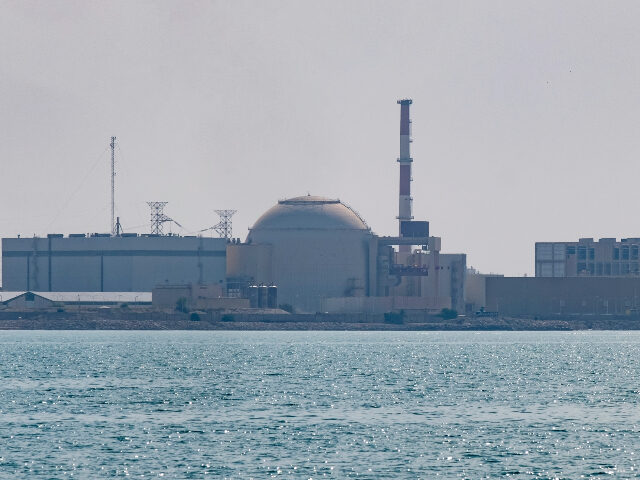IAEA Declares Iran In Breach of Nuclear Obligations for First Time in Nearly 20 Years
 Morteza Nikoubazl/NurPhoto via Getty
Morteza Nikoubazl/NurPhoto via Getty
The International Atomic Energy Agency (IAEA) has formally declared Iran in breach of its nuclear non-proliferation obligations for the first time in nearly 20 years.
The resolution passed on Thursday could pave the way for military action against Iran’s nuclear weapons program.
The governing board of the IAEA found Iran guilty of “many failures to uphold its obligations since 2019 to provide the agency with full and timely cooperation regarding undeclared nuclear material and activities at multiple undeclared locations.”
The board said Iran’s failure to cooperate “constitutes non-compliance with its obligations under its safeguards agreement with the agency.”
The momentous vote saw only Russia, China, and Burkina Faso voting no, while 11 countries abstained, and 19 voted in favor of the resolution.
Iran unsurprisingly rejected the resolution as “completely political and biased,” and said it would respond by opening yet another uranium enrichment center.
The IAEA was particularly concerned with traces of uranium found at three “undeclared” nuclear sites – in other words, nuclear research facilities Iran lied about and attempted to conceal.
The damning evidence was first discovered at sites in Varamin, Marivan, and Turquzabad in 2019 and 2020. Iran has been stonewalling inspectors, destroying evidence, and refusing to answer questions ever since.
The U.N. nuclear watchdog has also criticized Iran for enriching large quantities of uranium to levels of purity far beyond anything needed for peaceful research, manufacturing, or nuclear power.
IAEA Director Rafael Grossi spent the past five years awkwardly insisting diplomacy was preferable to conflict, while growing increasingly exasperated with Iranian intransigence. He appeared close to the end of his rope in early May, when he complained about Iran’s “completely unsatisfactory” conduct after a trip to Tehran.
“It’s a very frustrating situation. We continue our activities there, but at a minimum. They are restricting cooperation in a very unprecedented way,” he said in May, after months of insisting that “diplomacy” was still the best way to resolve the situation.
Grossi delivered a damning quarterly report to the IAEA Board of Governors on Monday, prompting speculation that diplomacy might soon come to an end, even as the Trump administration planned for more meetings with Iranian officials in Oman this weekend.
The first leaks about Grossi’s report made it sound as though Iran had finally exhausted the IAEA’s patience, even as Grossi publicly insisted he wanted negotiations to continue.
“I will continue to support and encourage the U.S. and Iran to spare no effort and exercise wisdom and political courage to bring this to a successful conclusion,” the director said on Monday.
Iran issued increasingly belligerent statements throughout the week, including threats to attack U.S. military bases across the Middle East, which led observers to conclude that an IAEA judgment of non-compliance could presage military action.
The U.S. withdrew non-essential embassy staff from Iraq on Thursday, another sign that trouble is expected. The State Department also offered departure options to staffers in Bahrain and Kuwait, while Defense Secretary Pete Hegseth “authorized the voluntary departure of military dependents” from across the Middle East.
On Wednesday, the UK Maritime Trade Operations Center warned ships in the Persian Gulf, the Gulf of Oman, and the Strait of Hormuz of “increased tensions within the region which could lead to an escalation of military activity.”
U.S. and European officials told the New York Times (NYT) on Thursday that Israel “appears to be preparing to launch an attack soon on Iran.”
The left-wing outlet claimed Israeli Prime Minister Benjamin Netanyahu has reportedly been trying to convince President Donald Trump that military action is the only way to halt Iran’s march toward atomic weapons. Trump has allegedly resisted military action while there was some hope for negotiations to prevail, but he seemed much less optimistic about that prospect this week. Trump spoke with Netanyahu on Monday, but the White House did not disclose details of their conversation.
Technically, Iran would have to be formally declared non-compliant a second time before the matter would be referred to the U.N. Security Council (UNSC), but the Iranians are clearly signaling they have no intention of taking positive steps toward avoiding a second censure.
“Iran intends to launch a series of retaliatory nuclear measures as soon as the resolution is adopted at the IAEA,” a senior Iranian official told CNN on Wednesday.
“These measures include scaling back cooperation with the agency and imposing certain restrictions, activating advanced and new-generation centrifuges, and removing monitoring cameras from the Isfahan facility,” the official said.
Although American and Israeli intelligence officials say Iran has always cheated on its non-proliferation obligations, the last time the IAEA formally declared Tehran non-compliant was in 2005. After Iran was declared non-compliant twice, UNSC imposed sanctions in December 2006.
Source link

